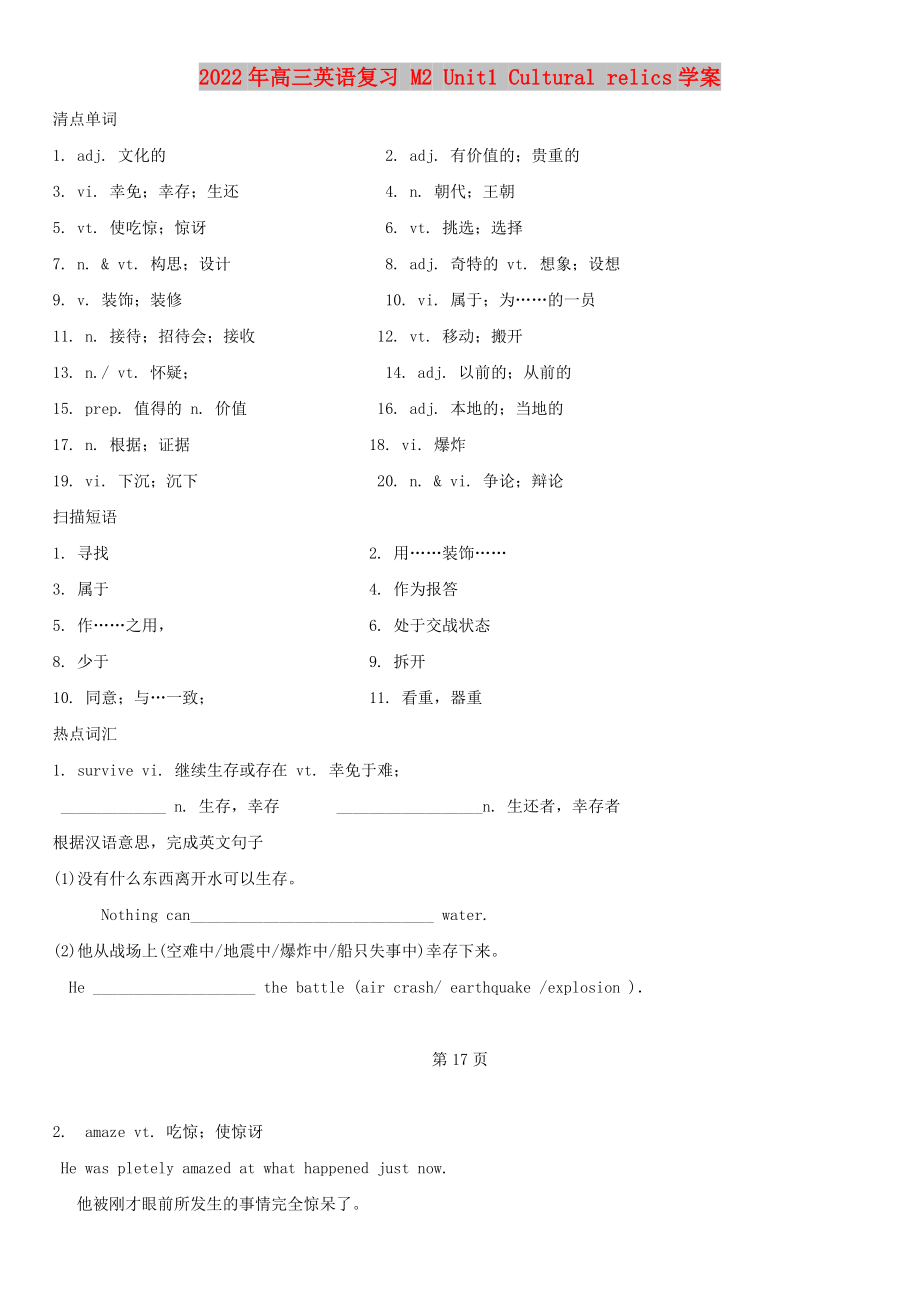《2022年高三英語(yǔ)復(fù)習(xí) M2 Unit1 Cultural relics學(xué)案》由會(huì)員分享,可在線閱讀����,更多相關(guān)《2022年高三英語(yǔ)復(fù)習(xí) M2 Unit1 Cultural relics學(xué)案(4頁(yè)珍藏版)》請(qǐng)?jiān)谘b配圖網(wǎng)上搜索���。
1、2022年高三英語(yǔ)復(fù)習(xí) M2 Unit1 Cultural relics學(xué)案
清點(diǎn)單詞
1. adj. 文化的 2. adj. 有價(jià)值的����;貴重的
3. vi. 幸免����;幸存;生還 4. n. 朝代����;王朝
5. vt. 使吃驚���;驚訝 6. vt. 挑選���;選擇
7. n. & vt. 構(gòu)思����;設(shè)計(jì) 8. adj. 奇特的 vt. 想象;設(shè)想
9. v. 裝飾��;裝修 10. vi.
2、屬于����;為……的一員
11. n. 接待����;招待會(huì);接收 12. vt. 移動(dòng)�����;搬開(kāi)
13. n./ vt. 懷疑�; 14. adj. 以前的�����;從前的
15. prep. 值得的 n. 價(jià)值 16. adj. 本地的;當(dāng)?shù)氐?
17. n. 根據(jù)�;證據(jù) 18. vi. 爆炸
19. vi. 下沉;沉下 20. n. & vi. 爭(zhēng)論��;辯論
掃描短語(yǔ)
3��、
1. 尋找 2. 用……裝飾……
3. 屬于 4. 作為報(bào)答
5. 作……之用���, 6. 處于交戰(zhàn)狀態(tài)
8. 少于 9. 拆開(kāi)
10. 同意�����;與…一致; 11. 看重���,器重
熱點(diǎn)詞匯
1. survive vi. 繼續(xù)生存或存在 vt. 幸免于難�����;
_____________ n. 生存,幸存
4����、__________________n. 生還者,幸存者
根據(jù)漢語(yǔ)意思���,完成英文句子
(1)沒(méi)有什么東西離開(kāi)水可以生存。
Nothing can______________________________ water.
(2)他從戰(zhàn)場(chǎng)上(空難中/地震中/爆炸中/船只失事中)幸存下來(lái)。
He ____________________ the battle (air crash/ earthquake /explosion ).
第17頁(yè)
2. amaze vt. 吃驚�;使驚訝
He was pletely amazed at what happe
5、ned just now.
他被剛才眼前所發(fā)生的事情完全驚呆了��。
________________adj. 感到驚訝的 _________________ adj. 令人驚奇的
_________________ n. 驚訝 be amazed __________… 對(duì)……感到驚訝
______________________________令某人吃驚的是
用所給詞的正確形式填空
(1) 令我感到驚訝的是�,他的英語(yǔ)取得了很大得進(jìn)步
___________________________________ , he made
6��、 a great progress in English.
(2)你豐富的知識(shí)令我吃驚����。I am ________ (amaze) at your rich knowledge.
(3)看到那種景象�����,他驚愕得呆呆地站在那里����。
He stood in ___________________ (amaze) at the sight.
3. wonder n. 驚奇���;奇跡,奇人/事 v. 不知道���,想知道
I wonder how I can succeed in writing.
我想知道如何在寫作上獲得成功��。
It's no won
7��、der (that) 難怪
wonder+從句 想知道
(1)請(qǐng)問(wèn)你是否可以幫我���。
I wonder _______����������������_______________________________________________.
(2)難怪他不餓,他整天在吃糖果���。
________________he is not hungry; he has been eating sweets all day.
(3)相信自己,你能創(chuàng)造奇跡�����。Trust yourself — you can work ________.
(4)Ted不知道警察
8����、局為什么要他去一趟���。 Ted _________________ he was wanted by the police.
4. in search of 尋找(介詞詞組)
search for尋找(某人或某物)
search+某人或某地+for…為找到某物或某人而搜查某地或搜某人的身
第18頁(yè)
Ⅰ.用search, search for填空
(1)The police ____________ the prisoner to see if he had a gun.
(2)A mother bird is ______________________
9��、_ food.
(3)Scientists are______________________ a cure for the disease.
Ⅱ.根據(jù)漢語(yǔ)意思�����,完成英文句子
(4)父母到處找孩子��,但沒(méi)有找到��。
The parents ____________________ their child here and there, but they didn't find him.
(5)他出去找些吃的東西�����。
He went out ___________________something to eat.
(6)這對(duì)夫婦為了他們丟失的狗找遍了
10、整條街���。
The couple ____________________ the whole street for their lost dog.
5. belong to 屬于
Two-thirds of the members belong to the wealthy class.
三分之二的成員屬于富有階級(jí)���。
注意:該短語(yǔ)只用于主動(dòng)語(yǔ)態(tài)����,不能用于被動(dòng)語(yǔ)態(tài);只用于一般時(shí)態(tài)����,不用于進(jìn)行時(shí)態(tài)�����。不要受漢語(yǔ)“屬于某人的”的影響而在belong to后誤接表示“某人的”的物主代詞或者名詞的所有格;而要接賓格或者直接接名詞�����。
用給詞的正確形式填
11���、空
(1)中國(guó)是個(gè)發(fā)展中國(guó)家,屬于第三世界��。
China is a developing country, _______________(belong) to the Third World.
(2)這輛小車是瑪麗的��。The car________________________________________________.����。
6. in return 作為回報(bào); in return _____ :作為對(duì)…的回報(bào)/交換
He helps others sincerely while demanding nothing i
12��、n return.
他真心實(shí)意地幫助別人���,并不求回報(bào)�����。
根據(jù)漢語(yǔ)意思��,完成英文句子
(1)他給我們?nèi)绱硕嗟膸椭蚁霝樗鲂┦伦鳛閳?bào)答��。
He has given us so much help that I really want to do something for him_________________.
.第19頁(yè)
7. I think _____ ( high) of those ____are searching for the Amber Room.
think highly of : 高度贊揚(yáng)/評(píng)價(jià)
think _____ , _____ (
13���、過(guò)去式���,過(guò)去分詞)
(1)他的繪畫受到世界上一些專家的好評(píng)���。
Some experts of the world__________________________________ his paintings.
1. Frederick William I, the King of Prussia, could_never_have_imagined that his greatest gift to the Russian people would have such an amazing history.
普魯士國(guó)王腓特烈·威廉一世絕不可能想到他送給俄羅斯人民的
14�、厚禮竟會(huì)有這樣一段令人驚奇的歷史�����。
could not/never have done sth不可能做了某事 (表示對(duì)過(guò)去所發(fā)生的事情的否定推測(cè))
他不可能看過(guò)這部電影.________________________________________________________
(情態(tài)動(dòng)詞+have done表對(duì)過(guò)去情況的推測(cè)與估計(jì))
(1)could have done sth.本來(lái)能做……(過(guò)去本來(lái)能做而未做)
(2)should have done sth.本來(lái)該做……(過(guò)去本來(lái)該做而未做)
(3)must+have done sth.一定……(對(duì)過(guò)去發(fā)生的事情的肯定推
15��、測(cè))
(4)needn’t have done sth.本來(lái)不必做……(過(guò)去不必做卻做了)
(5)might/may have done sth.可能做了……(過(guò)去可能做了某事�,可能性小)
根據(jù)漢語(yǔ)意思����,完成英文句子
(1)她可能這樣說(shuō)過(guò)。She ____________________ so.
(2)在那樣的情況下����,我們本來(lái)可以做得更好的�。
In those circumstances we __________________
(3)你本該早些告訴我這件事的�����。You ____________________ me this earlier.
(4)他可能讀過(guò)那本書嗎�?____________________________ the book?
2. In 1770 the room was pleted the _way_ she_wanted.
1770年,這間琥珀屋按照她的要求竣工了��。
句型 the way 后接定語(yǔ)從句: the way that/ in which +主語(yǔ)+謂語(yǔ)
我討厭你跟我說(shuō)話的方式����。I hate the way ____________________ you speak to me.
 2022年高三英語(yǔ)復(fù)習(xí) M2 Unit1 Cultural relics學(xué)案
2022年高三英語(yǔ)復(fù)習(xí) M2 Unit1 Cultural relics學(xué)案

